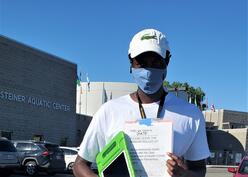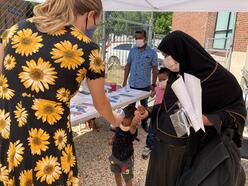Maha Elmashni is the health access program assistant at the International Rescue Committee (IRC) in Salt Lake City. That’s not all she does though. Through a partnership with the Utah Office of Health Disparities, the government entity tasked with equalizing healthcare and resource access for underserved communities, Maha—and a few other IRC staff members—also works as a community health worker. Community health workers in Utah usually help promote and advocate health access, now their job focuses specifically on the response to the COVID-19 pandemic.
The pandemic has revealed many disparities in health care and opportunity in communities of color, notably Black and Latinx communities. Utah policymakers in a special session during late spring expressed concerns about disproportionally affected communities and discussed ways to supply funding to a program that would seek to provide greater equality.

Pamela Silberman, health program manager, says the IRC was contacted for support since the Office of Health Disparities “knows we’re a competent agency,” Pamela shares. “Which is great,” she adds. “Because we’re doing this work already but they provided us with funding for this work we need to do.” The health team distributes information and hosts immunization clinics, but with this support, their reach is greater.
Maha and the other IRC staff members fit easily into the community health worker initiative, as they already work with refugees and speak multiple languages. Maha’s job as a community health worker entails providing necessities, such as donated food staples, as well as information to those who have tested positive. This includes myth breaking, like reassuring people that they can drink tap water if they cannot leave the house to purchase water. She connects with individuals who are tested for COVID-19 at the University of Utah’s Wellness Bus and follows up with them. Maha contacts those who have been infected or who are being tested and makes sure that they have ways to take care of themselves, whether that means they will need rental assistance or support remaining food secure in their homes.
“Refugees are in fragile circumstances,” Maha says. “[This program] assures them there are resources for their needs...They’re grateful that we check in.” However, the work done by community health workers and the IRC health team presents unique challenges. Pamela points out that other health workers only work within a single ethnic or language group, whereas her team and the community health workers work with various multi-ethnic communities all at once. Pamela says this has been the community health workers’ most significant success, that they have reached so many people across Salt Lake County despite barriers.

Maha has also been amazed that almost every person she has talked to about the COVID-19 virus regulations has known the information. “Refugees are well informed,” she shares. She remembers calling a former Burmese refugee who had been resettled by the IRC in Salt Lake City. She went through her list of coronavirus symptoms with him before learning that he was a pharmacist. “He was so humble,” she recalls. “He let me go through that whole list.”
Fortunately, the funding for community health workers has been extended through the end of December. This is especially important as community health work remains complex in the face of the pandemic. Stable funding streams, even short-term, ensure the diverse work of the IRC health team continues. "If there's an emergency,” Pamela shares. “You’re going to help regardless of whether you have someone to bill.” To her and her team, it doesn’t matter whether somebody is a current client, whether they need medication or information about a global pandemic. If people need help, the health team will be there for them.
Learn more about the IRC in Salt Lake City’s ongoing response to the coronavirus pandemic here.